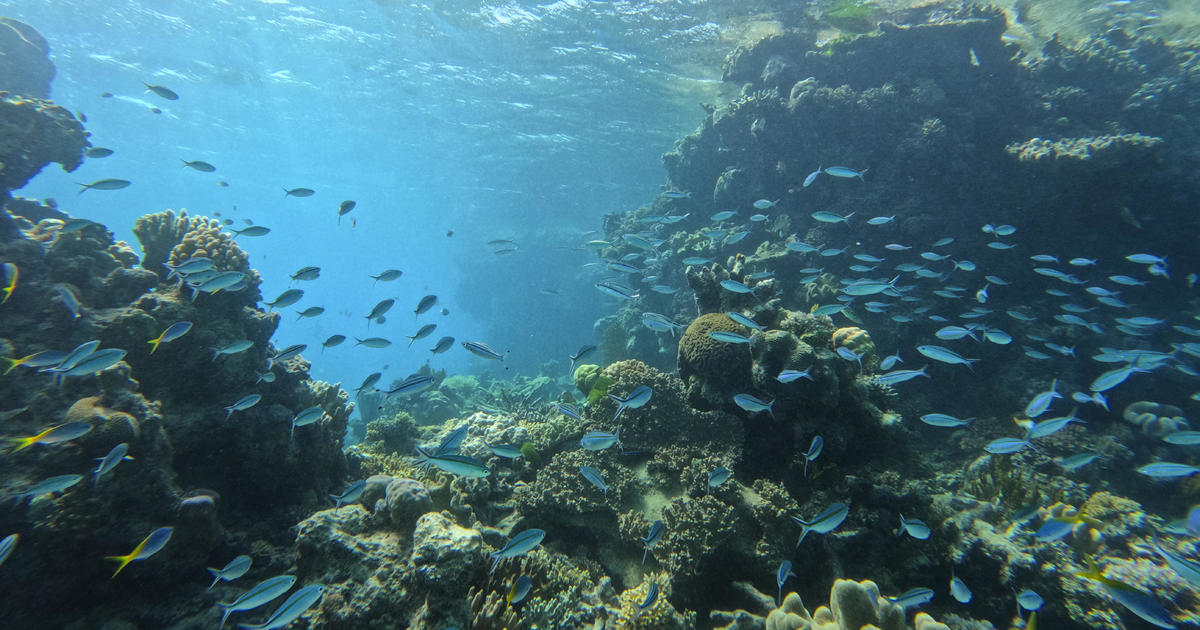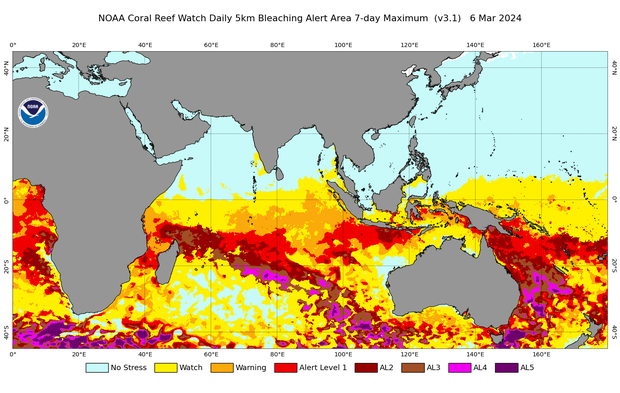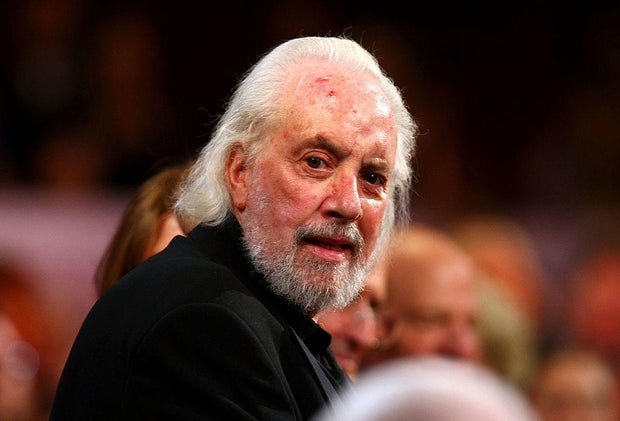CBS News
Great Barrier Reef undergoing mass coral bleaching event for 5th time in nearly a decade

The Great Barrier Reef – the world’s largest reef system that’s “one of the richest and most complex natural ecosystems on Earth” – is once again undergoing a mass coral bleaching event. Officials said the event, the fifth occurrence in just under a decade, appears to be the result of heat stress after a record-breaking year for global temperatures.
Officials with the Australian government-run Great Barrier Reef Marine Park Authority said Friday their team conducted aerial surveys over two-thirds of the nearly 133,000-square-mile area. Those surveys “revealed prevalent shallow water coral bleaching on most surveyed reefs,” the park said, adding it’s “consistent with patterns of heat stress that has built up over summer.”
“This unfolding coral bleaching event follows similar reports from reefs around the world during the past 12 months,” the authority said in an update on its website. “These Northern Hemisphere reefs have suffered coral bleaching as a result of climate change-driven elevated ocean temperatures, amplified by El Niño conditions in the Pacific Ocean.”
Michael Robinson Chavez/The Washington Post via Getty Images
Coral bleaching can occur from stress caused by various reasons – temperature, light or nutrients. When the animals are stressed, the algae that live within their tissues as their primary food source, leaves. The algae also provide the coral with their usual vibrant color, which is why the animals turn white, or become bleached, when the algae leave.
While the current event is widespread, its severity and depth vary throughout the surveyed parts of the reef system. The bleaching event’s true extent is unknown and will be evaluated through in-water research.
NOAA Coral Reef Watch
The National Oceanic and Atmospheric Administration’s Coral Reef Watch program’s bleaching alert system shows that the areas in and around the Great Barrier Reef are at-risk of undergoing bleaching on all levels, ranked from 1 to 5, with 5 being “risk of near complete mortality.”
Bleached coral is not dead, but they are significantly more vulnerable.
“If the water temperatures are much higher than normal or continue for several weeks, bleached corals can die from stress or starvation,” the authority says. “…Even a severely affected reef can recover over time as surviving corals grow and new coral larvae settle on the reef.”
The Great Barrier Reef is a UNESCO World Heritage Site, which the group calls a “globally outstanding and significant entity.” The system, which is bigger than the U.K., Switzerland and Holland combined — or roughly half the size of Texas — is “one of the richest and most complex natural ecosystems on Earth.”
“There are over 1,500 species of fish, about 400 species of coral, 4,000 species of mollusk, and some 240 species of birds, plus a great diversity of sponges, anemones, marine worms, crustaceans, and other species. No other World Heritage property contains such biodiversity,” UNESCO says on its website. “This diversity, especially the endemic species, means the GBR is of enormous scientific and intrinsic importance, and it also contains a significant number of threatened species.”
The Great Barrier Reef has been plagued by mass bleaching events several times in the past two decades. According to the Great Barrier Reef Foundation, this marks the eighth event since 1998 and the fifth in just nine years. The most recent mass bleaching happened in 2022 during a La Niña summer, which the foundation said was “particularly concerning” as that weather phenomenon, unlike El Niño, “typically brings cooler, wetter conditions.”
Along with limiting fishing to help in the reef’s recovery, officials at the authority said the best action people can take is to tackle their role in the underlying issue – climate change. As global temperatures rise, largely from humans emitting planet-warming gases through the burning of fossil fuels, sea surface temperatures also rise.
“It’s the combination of local and global actions that will best able the reef to tolerate and recover from events such as these,” Park Authority Chief Scientist Roger Beeden said, “and overall we continue our work to make sure we secure the future of the Great Barrier Reef.”
In the Great Barrier Reef, the average sea surface temperature has increased by more than 0.8 degrees Celsius since 1880, the authority says, with the warmest years happening in the past two decades. Earlier this week, scientists announced that last month was the hottest February on record, with the oceans also seeing record highs.
“Climate change is the biggest risk, not just to the Great Barrier Reef in Australia, but also to coral reefs around the world,” Australian Minister for the Environment and Water Tanya Plibersek said in a video, adding on X, the platform formerly known as Twitter, “We need to protect our special places and the plants and animals that call them home.”
CBS News
7/2: CBS Evening News – CBS News

Watch CBS News
Be the first to know
Get browser notifications for breaking news, live events, and exclusive reporting.
CBS News
Robert Towne, legendary Hollywood screenwriter of “Chinatown,” dies at 89

Robert Towne, the Oscar-winning screenplay writer of “Shampoo,” “The Last Detail” and other acclaimed films whose work on “Chinatown” became a model of the art form and helped define the jaded allure of his native Los Angeles, has died. He was 89.
Towne “passed away peacefully surrounded by his loving family” Monday at his home in Los Angeles, his publicist Carri McClure, told CBS News in a statement. She did not provide a cause of death.
In an industry which gave birth to rueful jokes about the writer’s status, Towne for a time held prestige comparable to the actors and directors he worked with. Through his friendships with two of the biggest stars of the 1960s and ’70s, Warren Beatty and Jack Nicholson, he wrote or co-wrote some of the signature films of an era when artists held an unusual level of creative control. The rare “auteur” among screen writers, Towne managed to bring a highly personal and influential vision of Los Angeles onto the screen.
Alberto E. Rodriguez/Getty Images for AFI
“It’s a city that’s so illusory,” Towne told The Associated Press in a 2006 interview. “It’s the westernmost west of America. It’s a sort of place of last resort. It’s a place where, in a word, people go to make their dreams come true. And they’re forever disappointed.”
Recognizable around Hollywood for his high forehead and full beard, Towne won an Academy Award for “Chinatown” and was nominated three other times, for “The Last Detail,” “Shampoo” and “Greystoke.” In 1997, he received a lifetime achievement award from the Writers Guild of America.
“His life, like the characters he created, was incisive, iconoclastic and entirely (original),” said “Shampoo” actor Lee Grant on X.
Towne was born Robert Bertram Schwartz in Los Angeles and moved to San Pedro after his father’s business, a dress shop, closed down because of the Great Depression. His father changed the family name to Towne.
Towne’s success came after a long stretch of working in television, including “The Man from U.N.C.L.E” and “The Lloyd Bridges Show,” and on low-budget movies for “B” producer Roger Corman. In a classic show business story, he owed his breakthrough in part to his psychiatrist, through whom he met Beatty, a fellow patient. As Beatty worked on “Bonnie and Clyde,” he brought in Towne for revisions of the Robert Benton-David Newman script and had him on the set while the movie was filmed in Texas.
Towne’s contributions were uncredited for “Bonnie and Clyde,” the landmark crime film released in 1967, and for years he was a favorite ghost writer. He helped out on “The Godfather,” “The Parallax View” and “Heaven Can Wait” among others and referred to himself as a “relief pitcher who could come in for an inning, not pitch the whole game.” But Towne was credited by name for Nicholson’s macho “The Last Detail” and Beatty’s sex comedy “Shampoo” and was immortalized by “Chinatown,” the 1974 thriller set during the Great Depression.
“Chinatown” was directed by Roman Polanski and starred Nicholson as J.J. “Jake” Gittes, a private detective asked to follow the husband of Evelyn Mulwray (played by Faye Dunaway). The husband is chief engineer of the Los Angeles Department of Water and Power and Gittes finds himself caught in a chaotic spiral of corruption and violence, embodied by Evelyn’s ruthless father, Noah Cross (John Huston).
Influenced by the fiction of Raymond Chandler, Towne resurrected the menace and mood of a classic Los Angeles film noir, but cast Gittes’ labyrinthine odyssey across a grander and more insidious portrait of Southern California. Clues accumulate into a timeless detective tale, and lead helplessly to tragedy, summed up by one of the most repeated lines in movie history, words of grim fatalism a devastated Gittes receives from his partner Lawrence Walsh (Joe Mantell): “Forget it, Jake, it’s Chinatown.”
The back story of “Chinatown” has itself become a kind of detective story, explored in producer Robert Evans’ memoir, “The Kid Stays in the Picture”; in Peter Biskind’s “East Riders, Raging Bulls,” a history of 1960s-1970s Hollywood, and in Sam Wasson’s “The Big Goodbye,” dedicated entirely to “Chinatown.” In “The Big Goodbye,” published in 2020, Wasson alleged that Towne was helped extensively by a ghost writer — former college roommate Edward Taylor. According to “The Big Goodbye,” for which Towne declined to be interviewed, Taylor did not ask for credit on the film because his “friendship with Robert” mattered more.
The studios assumed more power after the mid-1970s and Towne’s standing declined. His own efforts at directing, including “Personal Best” and “Tequila Sunrise,” had mixed results. “The Two Jakes,” the long-awaited sequel to “Chinatown,” was a commercial and critical disappointment when released in 1990 and led to a temporary estrangement between Towne and Nicholson.
Around the same time, he agreed to work on a movie far removed from the art-house aspirations of the ’70s, the Don Simpson-Jerry Bruckheimer production “Days of Thunder,” starring Tom Cruise as a race car driver and Robert Duvall as his crew chief. The 1990 movie was famously over budget and mostly panned, although its admirers include Quentin Tarantino and countless racing fans. And Towne’s script popularized an expression used by Duvall after Cruise complains another car slammed him: “He didn’t slam into you, he didn’t bump you, he didn’t nudge you. He rubbed you.
“And rubbin,′ son, is racin.'”
Towne later worked with Cruise on “The Firm” and the first two “Mission: Impossible” movies. His most recent film was “Ask the Dust,” a Los Angeles story he wrote and directed that came out in 2006. Towne was married twice, the second time to Luisa Gaule, and had two children. His brother, Roger Towne, also wrote screenplays, his credits include “The Natural.”
CBS News
Analyzing impact of Supreme Court’s Trump immunity decision

Watch CBS News
Be the first to know
Get browser notifications for breaking news, live events, and exclusive reporting.












